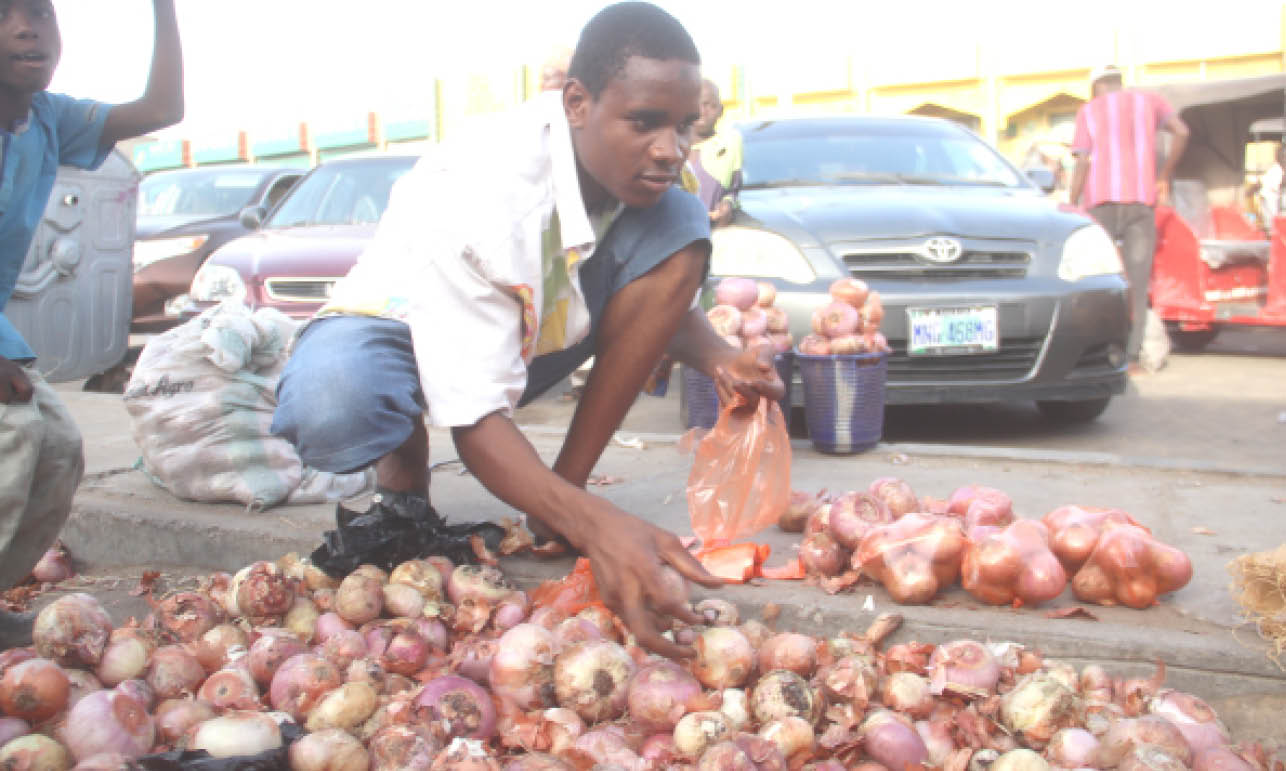There is significant rise in the prices of vegetables in several markets around Maiduguri, the Borno State capital.
This situation has put many households under pressure as a market survey by Daily Trust in Maiduguri metropolis, revealed that the prices of tomatoes, peppers, onions and other vegetables have increased by almost 50 percent.
In some of the markets visited, both sellers and buyers complained bitterly about the sharp increase in the price of the vegetables, with buyers accusing sellers, and the sellers in turn blaming farmers.
At Bulunkutu market, our correspondent gathered that the cost of a small measure of tomatoes has increased from N200 to N500, while the cost of pepper also rose to N400.
- Why Nigerian yams are rejected in foreign markers – Agronomist
- Tomato, pepper prices continue to swell as consumers face tough choices
Many households said they have shifted to tomato paste and dry chillies as alternatives, to save cost.
Malama Aisha Abubakar, a buyer at Bulunkutu market, said the tomatoes she bought for N1000 a week ago, has risen to N3,500.
“Initially, I took it for a joke because he is my regular seller but he insisted, complaining that they were not happy with the situation.
“I bought a little from him, with the plan of adding tomato paste to it. It’s cheaper to buy the paste now. In situations like this, I switch to fried rice, jollof rice and suspend cooking stew,” she said.
A food vendor, Helen Jonah, said the situation is affecting restaurants and food vendors in the town.

“I know many food vendors who have closed down because of the cost of vegetables in this town. When you ask the seller to reduce the price, they would tell you that they bought Ogbono, Ugu leaf and crayfish from Onisha, and the cost of transporting them must be added to the price.
Another customer, Saira Ilya, said a measure of tomatoes they use to buy N400 now cost N1,100.
“We know that everything in Nigeria is costly due to cost of transportation, but what happened to tomatoes that the price shot up astronomically? We produce it at our back yard and yet the price keeps increasing. What is the problem of this country?” She asked.
A buyer at the popular Baga Market, Tijjani Yusuf, who lamented the effect of the high cost of vegetables, faulted the government for allowing businessmen to change the price of goods unchecked.
“Just a few days back, I bought tomatoes and onions here at a reasonable price. I spent N1,000 and got enough vegetables to cook but today, they gave me six pieces of tomato and five pieces of pepper at N1000.
“Why are these traders being unreasonable everyday and the government only watches them exploiting the masses. You the media should tell the government to control these people before it gets too late,” he said.
Speaking to Daily Trust, one of the vegetable sellers said the prices went up due to delayed rainfall which causes pest attacks on the vegetables.
“With delayed rainfall, the temperature became too high, and lack of proper rain led to pest attacks on the vegetables like tomatoes, and so the scarcity of the product led to high cost,” he said.
Aliyu Abubakar, an onion and tomato seller at Monday market, said the price has gone too high, and the number of customers patronising his business has gone down.
“Weeks back, a bag of onion sold at N8,000 but now it is N33,000; a basket of tomatoes was N20,000 but I bought it N70,000 today. We usually experience such things when the rainy season is about to set in but not as severe as this time. In fact, I don’t know how to describe the situation,” he said.
Rosemary David, a vegetable seller at Monday market, lamented that the prices of Ogbono, Okra and Ugu leaf have also doubled due to transportation cost.
“The Ugu leaf that I usually buy N3,500 is now N8,000. The Ogbono we used to sell N100 a few days back is now N200 because it’s very expensive. And it all boils down to transport cost.
“The worst part is that we now have thieves everywhere; they came to the market and packed all my goods. Stealing has become rampant because of the hardship people are going through. Let the government do something about it, the situation is getting out of hand,” she said.
Another seller at the Monday Market, Danbaba Saidu, attributed the problem to subsidy removal. “Before now, we used to pay N3,000 to transport a small bag of Ogbono but it is now N8000. How do you expect us to reduce the price? It’s a fall-out of the fuel subsidy removal. To eat food is not easy now.”
Mary Mogbodo, another vegetables seller, said the high cost of vegetables is making the business unattractive for both the sellers and the buyers.
“Even we (the sellers) are also managing to survive because people don’t have money and the goods are expensive. You will spend the whole day selling very few vegetables.
An agronomist, Magaji Zakaria, said it’s normal to have a supply gap of vegetables when there is delayed rainfall or pest infestation.
“Like now, pests attacked irrigation farms in many states like Bauchi, Taraba, and Kano where a lot of vegetables are being produced. This has affected the output, coupled with the delayed rainfall that makes the temperature too high.
“Also, it’s the lack of timely rain that led to the pest attacks on the vegetables, thereby contributing to the scarcity of the product, which attracted the high cost,” he said.

 Join Daily Trust WhatsApp Community For Quick Access To News and Happenings Around You.
Join Daily Trust WhatsApp Community For Quick Access To News and Happenings Around You.

